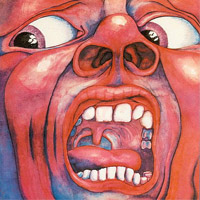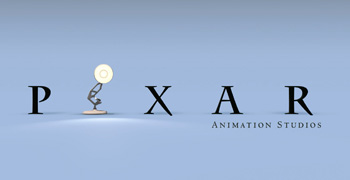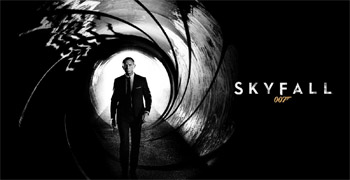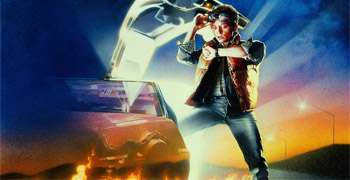 KFLAP.COM
KFLAP.COM
 KFLAP.COM
KFLAP.COM

Alien At 35
Happy Birthday, Alien!
This year the vastly influential sci-fi horror Alien turns 35, so to mark the anniversary we're going to delve into what makes Alien such an innovative film with a strong, lasting legacy and why it deserves its esteemed place in cinema history; indeed, it has earned the approval of the National Film Preservation Board of the United States for the massive impact it has had on the world of film.
Alien is simply an extremely well-done movie, and when you think about it in its 1979 context, rather groundbreaking. The movie is a nicely balanced fusion of horror and sci-fi. Of course, the ideas Alien has in terms of horror and sci-fi weren't brand-spanking new, but it was one of the first movies to have such a graceful, commercially successful blend of both horror and sci-fi in the same movie. Not only that, but in my opinion the film more than meets the expectations of both genres.
On the horror front, the movie definitely goes about things in the right way. Alien is patient, delivering its scares at a slow but effective pace. It keeps its powder dry to build up tension, it uses action sparingly for maximum effect, and it can also let your imagination do some work as well. This is exemplified even in the opening scenes; the steady, quiet tour through the eerily empty corridors of the ship at the start reminds the viewer just how lonely it is in space, and how maddening the near-complete silence can be when no-one is walking along with you. Then, as the distress call from the nearby planet wakes the ship up, tension continues to be built up smoothly and gradually, with discoveries of unknown life-forms not allowing you to predict what happens next (on the first watch, at least).
Once the alien is let loose, the film does not indulge in a gore-fest, instead allowing the claustrophobic set to add to the jangling of nerves as the creature engages in a drawn-out, cat-and-mouse hunt of the crew. The alien itself is also handled with care, sometimes making a direct appearance, but much of the time residing in fleeting glimpses, abstract radar blips or terrified radio transmissions. This gives you some space to build up an image of the alien in your head, allowing you to reconstruct for yourself the scenes in which the radios of the hapless crew members go dark for the last time- all of which only serves to make the concept of the alien that much scarier.

It's not only the pacing and the dark, cramped setting that make for a good horror formula here. The characters are also an essential part of it; after all, one of the best ways to make something scary is to make it relatable. To this end, the characters aren't exciting or dramatic- you might even say they're quite uncharismatic- but they're human. They make mistakes, they forget things, they get demoralised when things go wrong. They even squabble over mundane, quintessentially human matters such as bonuses and pay rises. It's this fallibility that ratchets up the tension even more, as their characters could plausibly be any one of us, while the indecision of the captain and his crew in the face of such a cunning, tactical enemy doesn't let you put much faith in your protagonists either. Having such weak characters makes the plot less formulaic and the experience more readily immersive, giving a great setup for scares along the way.
Such an emphasis on horror has led many people to say that Alien is really a horror movie in a sci-fi setting. Perhaps, but there is also much to offer in sci-fi terms as well. At a basic level, the overall aesthetic of Alien is something that should leave sci-fi fans pleased: a hard sci-fi, very functional look to the ship and the crew's equipment, which also lends itself to the horror aspect with its enhanced plausibility and realism. Furthermore, what sci-fi does well is in offering a view of the future course of humanity given a few assumed conditions. Well, in my opinion, Alien gives a very clear view of humanity in the future, and a bleak one at that: nothing has really changed, and nothing seems to matter either. People are still divided by class, still haggling over wages and complaining about their wealthier superiors. Power is exercised by "the corporation", a cold, brutal, even dictatorial machine which is very happy to view crewmen as expendable units to use in the interest of science as well as to exploit those crewmembers, forcing them to undergo mortal dangers if they want to receive their paycheck at the end of the expedition. Not only that, but our grand visions of a great or benevolent alien civilisation fall very short; instead of a knowledgeable, rational society, we get an instinctual, survivalist killing machine. Part of the appeal of Alien is in its gritty, almost nihilistic outlook: there are no good guys in the future; there are no rules, no "delusions of morality" - it's only about survival.
Those aren't the only respects in which Alien is an engaging film, either. For instance, we see in the character of Ripley a strong, resourceful female role, who is capable of leading as well as making tough decisions in an informed way. A far cry from the damsel-in-distress treatment of many female characters in sci-fi and horror settings, then. In this way Alien breaks some of the typical conventions when it comes to characters- rather than the standard alpha male taking charge of his semi-relevant team for all of the film until the bad guys get sufficiently zapped, everyone in Alien gets essentially equal treatment. They're all helpless against the alien, they're all scared, and they're all trying their best to survive. It challenges a few gender notions regarding character as well as making the dynamics of the characters a little more interesting.
Some of the techniques involved in directing were also masterful in giving Alien a slightly sharper edge for its day. The "chestburster" scene, for instance, is what instantly comes to mind as the iconic scene of Alien. The reason it's such a shocking, high-impact scene is partly thanks to John Hurt's very convincing convulsions, but also owes to the fact that the cast weren't entirely prepared for the scene. That is to say, they knew basically what was going to happen, but weren't told how it would work or that fake blood was to be pumped out from the mannequin, resulting in a reaction of genuine surprise and shock which captures the essence of the situation. This is another example of the fantastic directing in the film which definitely elevates the whole endeavour.
As a film in itself, Alien is a masterpiece of both horror and sci-fi, but in some ways it's still with us in the form of its long legacy. Of course, it spawned three sequels which though quite different in tone to the original kept the Alien universe alive in the cinema. Even just a few years after its release, elements of Alien were inspiring ideas in other movies and TV series, causing some to adapt their names and even their content to emulate Alien's characteristics.
Its influence isn't confined to the cinema, either; Alien built up a sizeable collection of merchandise and video game adaptations (which, sadly, haven't so far been able to capture the feel of the original film). Its influence is even clear in completely different franchises, such as Warhammer: 40,000, where the Tyranid faction (especially the Genestealers) in many ways share a remarkable similarity to Alien.
As such, you can't deny that Alien is a gargantuan figure in the worlds of sci-fi and horror in equal measure. It offers a gut-wrenching but also numbing view into a future where morality may not even matter in the end and progress seems to be in name only, all the while utilising a primal fear of being the lone survivor, an inferior prey at the mercy of a calculating, ruthless predator who you can't fight or outrun. Put yourself in Ripley's position and the film has no difficulty in setting off some of our most basic fears. Even 35 years on, we can still see that Alien pushed the boat out for its time and continues to be a thoroughly enjoyable watch, as well as inspiring a whole branch of films and media that take Alien as their starting point. It definitely seems as though the National Film Preservation Board was right on this one, because this is a gem that's worth keeping.
This year the vastly influential sci-fi horror Alien turns 35, so to mark the anniversary we're going to delve into what makes Alien such an innovative film with a strong, lasting legacy and why it deserves its esteemed place in cinema history; indeed, it has earned the approval of the National Film Preservation Board of the United States for the massive impact it has had on the world of film.
Alien is simply an extremely well-done movie, and when you think about it in its 1979 context, rather groundbreaking. The movie is a nicely balanced fusion of horror and sci-fi. Of course, the ideas Alien has in terms of horror and sci-fi weren't brand-spanking new, but it was one of the first movies to have such a graceful, commercially successful blend of both horror and sci-fi in the same movie. Not only that, but in my opinion the film more than meets the expectations of both genres.
On the horror front, the movie definitely goes about things in the right way. Alien is patient, delivering its scares at a slow but effective pace. It keeps its powder dry to build up tension, it uses action sparingly for maximum effect, and it can also let your imagination do some work as well. This is exemplified even in the opening scenes; the steady, quiet tour through the eerily empty corridors of the ship at the start reminds the viewer just how lonely it is in space, and how maddening the near-complete silence can be when no-one is walking along with you. Then, as the distress call from the nearby planet wakes the ship up, tension continues to be built up smoothly and gradually, with discoveries of unknown life-forms not allowing you to predict what happens next (on the first watch, at least).
Once the alien is let loose, the film does not indulge in a gore-fest, instead allowing the claustrophobic set to add to the jangling of nerves as the creature engages in a drawn-out, cat-and-mouse hunt of the crew. The alien itself is also handled with care, sometimes making a direct appearance, but much of the time residing in fleeting glimpses, abstract radar blips or terrified radio transmissions. This gives you some space to build up an image of the alien in your head, allowing you to reconstruct for yourself the scenes in which the radios of the hapless crew members go dark for the last time- all of which only serves to make the concept of the alien that much scarier.

It's not only the pacing and the dark, cramped setting that make for a good horror formula here. The characters are also an essential part of it; after all, one of the best ways to make something scary is to make it relatable. To this end, the characters aren't exciting or dramatic- you might even say they're quite uncharismatic- but they're human. They make mistakes, they forget things, they get demoralised when things go wrong. They even squabble over mundane, quintessentially human matters such as bonuses and pay rises. It's this fallibility that ratchets up the tension even more, as their characters could plausibly be any one of us, while the indecision of the captain and his crew in the face of such a cunning, tactical enemy doesn't let you put much faith in your protagonists either. Having such weak characters makes the plot less formulaic and the experience more readily immersive, giving a great setup for scares along the way.
Such an emphasis on horror has led many people to say that Alien is really a horror movie in a sci-fi setting. Perhaps, but there is also much to offer in sci-fi terms as well. At a basic level, the overall aesthetic of Alien is something that should leave sci-fi fans pleased: a hard sci-fi, very functional look to the ship and the crew's equipment, which also lends itself to the horror aspect with its enhanced plausibility and realism. Furthermore, what sci-fi does well is in offering a view of the future course of humanity given a few assumed conditions. Well, in my opinion, Alien gives a very clear view of humanity in the future, and a bleak one at that: nothing has really changed, and nothing seems to matter either. People are still divided by class, still haggling over wages and complaining about their wealthier superiors. Power is exercised by "the corporation", a cold, brutal, even dictatorial machine which is very happy to view crewmen as expendable units to use in the interest of science as well as to exploit those crewmembers, forcing them to undergo mortal dangers if they want to receive their paycheck at the end of the expedition. Not only that, but our grand visions of a great or benevolent alien civilisation fall very short; instead of a knowledgeable, rational society, we get an instinctual, survivalist killing machine. Part of the appeal of Alien is in its gritty, almost nihilistic outlook: there are no good guys in the future; there are no rules, no "delusions of morality" - it's only about survival.
Those aren't the only respects in which Alien is an engaging film, either. For instance, we see in the character of Ripley a strong, resourceful female role, who is capable of leading as well as making tough decisions in an informed way. A far cry from the damsel-in-distress treatment of many female characters in sci-fi and horror settings, then. In this way Alien breaks some of the typical conventions when it comes to characters- rather than the standard alpha male taking charge of his semi-relevant team for all of the film until the bad guys get sufficiently zapped, everyone in Alien gets essentially equal treatment. They're all helpless against the alien, they're all scared, and they're all trying their best to survive. It challenges a few gender notions regarding character as well as making the dynamics of the characters a little more interesting.
Some of the techniques involved in directing were also masterful in giving Alien a slightly sharper edge for its day. The "chestburster" scene, for instance, is what instantly comes to mind as the iconic scene of Alien. The reason it's such a shocking, high-impact scene is partly thanks to John Hurt's very convincing convulsions, but also owes to the fact that the cast weren't entirely prepared for the scene. That is to say, they knew basically what was going to happen, but weren't told how it would work or that fake blood was to be pumped out from the mannequin, resulting in a reaction of genuine surprise and shock which captures the essence of the situation. This is another example of the fantastic directing in the film which definitely elevates the whole endeavour.
As a film in itself, Alien is a masterpiece of both horror and sci-fi, but in some ways it's still with us in the form of its long legacy. Of course, it spawned three sequels which though quite different in tone to the original kept the Alien universe alive in the cinema. Even just a few years after its release, elements of Alien were inspiring ideas in other movies and TV series, causing some to adapt their names and even their content to emulate Alien's characteristics.
Its influence isn't confined to the cinema, either; Alien built up a sizeable collection of merchandise and video game adaptations (which, sadly, haven't so far been able to capture the feel of the original film). Its influence is even clear in completely different franchises, such as Warhammer: 40,000, where the Tyranid faction (especially the Genestealers) in many ways share a remarkable similarity to Alien.
As such, you can't deny that Alien is a gargantuan figure in the worlds of sci-fi and horror in equal measure. It offers a gut-wrenching but also numbing view into a future where morality may not even matter in the end and progress seems to be in name only, all the while utilising a primal fear of being the lone survivor, an inferior prey at the mercy of a calculating, ruthless predator who you can't fight or outrun. Put yourself in Ripley's position and the film has no difficulty in setting off some of our most basic fears. Even 35 years on, we can still see that Alien pushed the boat out for its time and continues to be a thoroughly enjoyable watch, as well as inspiring a whole branch of films and media that take Alien as their starting point. It definitely seems as though the National Film Preservation Board was right on this one, because this is a gem that's worth keeping.
About the author: Sam Robinson
 The Senior Content Editor for Kflap.com, Sam is a student with a passion for Film and Video Games.
The Senior Content Editor for Kflap.com, Sam is a student with a passion for Film and Video Games.
 RELATED POSTS
RELATED POSTS



